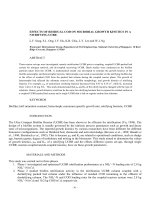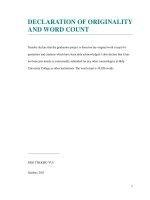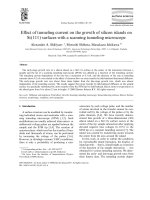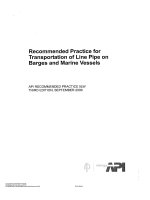- Trang chủ >>
- Khoa Học Tự Nhiên >>
- Vật lý
images of empiricism essays on science and stances with a reply from bas van fraassen nov 2007
Bạn đang xem bản rút gọn của tài liệu. Xem và tải ngay bản đầy đủ của tài liệu tại đây (1.95 MB, 401 trang )
Images of Empiricism
MIND ASSOCIATION OCCASIONAL SERIES
This series consists of occasional volumes of original
papers on predefined themes. The Mind Association
nominates an editor or editors for each collection, and
may cooperate with other bodies in promoting
conferences or other scholarly activities in connection
with the preparation of particular volumes.
Publications Officer:M.A.Stewart
Secretary: R. D. Hopkins
Images of Empiricism
Essays on Science and Stances,
with a Reply from Bas C. van Fraassen
Bradley Monton
1
1
Great Clarendon Street, Oxford ox26dp
Oxford University Press is a department of the University of Oxford.
It furthers the University’s objective of excellence in research, scholarship,
and education by publishing worldwide in
Oxford New York
Auckland Cape Town Dar es Salaam Hong Kong Karachi
Kuala Lumpur Madrid Melbourne Mexico City Nairobi
New Delhi Shanghai Taipei Toronto
With offices in
Argentina Austria Brazil Chile Czech Republic France Greece
Guatemala Hungary Italy Japan Poland Portugal Singapore
South Korea Switzerland Thailand Turkey Ukraine Vietnam
Oxford is a registered trade mark of Oxford University Press
in the UK and in certain other countries
Published in the United States
by Oxford University Press Inc., New York
the several contributors 2007
The moral rights of the authors have been asserted
Database right Oxford University Press (maker)
First published 2007
All rights reserved. No part of this publication may be reproduced,
stored in a retrieval system, or transmitted, in any form or by any means,
without the prior permission in writing of Oxford University Press,
or as expressly permitted by law, or under terms agreed with the appropriate
reprographics rights organization. Enquiries concerning reproduction
outside the scope of the above should be sent to the Rights Department,
Oxford University Press, at the address above
You must not circulate this book in any other binding or cover
and you must impose this same condition on any acquirer
British Library Cataloguing in Publication Data
Data available
Library of Congress Cataloging in Publication Data
Data available
Typeset by Laserwords Private Limited, Chennai, India
Printed in Great Britain
on acid-free paper by
Biddles Ltd, King’s Lynn, Norfolk
ISBN 978–0–19–921884–4
13579108642
CONTENTS
Acknowledgements vii
Notes on contributors ix
1. Introduction 1
Bradley Monton
Part I: The Scientific Image 9
2. Constructive Empiricism and the Argument from
Underdetermination 11
Maarten Van Dyck
3. Why be Hanged for Even a Lamb? 32
Nancy Cartwright
4. The Epistemology of Constructive Empiricism 46
James Ladyman
5. Underdetermination and Evidence 62
Alexander Bird
6. An Empiricist Critique of Constructive Empiricism:
The Aim of Science 83
Philip Percival
7. Accepting Contradictions 117
Peter Lipton
8. Putting a Bridle on Irrationality: An Appraisal of van Fraassen’s
New Epistemology 134
Stathis Psillos
vi / Contents
Part II: The Empirical Stance 165
9. Taking an Empirical Stance 167
Ernan McMullin
10. Six Degrees of Speculation: Metaphysics in Empirical Contexts 183
Anjan Chakravartty
11. The Dilemma of Empiricist Belief 209
Chad Mohler
12. Materialism, Stances, and Open-Mindedness 229
Michel Bitbol
13. Must Empiricism Be a Stance, and Could it Be One? How to Be
an Empiricist and a Philosopher at the Same Time 271
Anja Jauernig
14. Farewell to Empiricism 319
Dien Ho
Part III: Van Fraassen’s Reply 335
15. From a View of Science to a New Empiricism 337
Bas C. van Fraassen
Index 385
ACKNOWLEDGEMENTS
Some of the essays in this book are based on talks given at a conference
on van Fraassen’s work organized by Roger Young; thanks to Young for
putting together that conference. I thank Alexander Bird and James Ladyman
for suggesting that I edit this book, and putting me in touch with Oxford
University Press. I thank Colleen Lock for her assistance with the editing
process. And on behalf of all the contributors, thanks to Bas C. van Fraassen
for inspiring us to think in new ways about the important issues discussed in
this book.
Bradley Monton
University of Colorado at Boulder
This page intentionally left blank
NOTES ON CONTRIBUTORS
Alexander Bird holds the Chair in Philosophy at the University of Bristol. His
research interests are primarily in philosophy of science and metaphysics.
Michel Bitbol is the Directeur de Recherche CNRS in Paris. He works at
the CREA (Centre de Recherche en
´
epist
´
emologie appliqu
´
ee) of the Ecole
Polytechnique. He specializes inphilosophyofphysics and philosophy of mind.
Nancy Cartwright is the Chair of the Centre for Philosophy of Natural and
Social Science and Professor of Philosophy in the Department of Philosophy,
Logic, and Scientific Method at the London School of Economics. She is
also Professor of Philosophy at the University of California, San Diego. Her
principal interests are philosophy and history of science (especially physics and
economics), causal inference, and objectivity in science.
Anjan Chakravartty is Associate Professor in the Institute for the History and
Philosophy of Science and Technology, and Department of Philosophy, at the
University of Toronto. He works on realism and anti-realism, laws and kinds,
and scientific representation, and is the author of A Metaphysics for Scientific
Realism: Knowing the Unobservable (Cambridge University Press, 2007).
Dien Ho is Assistant Professor of Philosophy at Massachusetts College of
Pharmacy and Health Sciences. His specializations include philosophy of
science and bio-medical ethics.
Anja Jauernig is Assistant Professor of Philosophy at the University of Notre
Dame. She specializes in modern philosophy (especially Kant and Leibniz), and
philosophy of science.
James Ladyman is Professor of Philosophy at the University of Bristol. His
research interests are primarily in philosophy of science, especially the meta-
physics of physics.
Peter Lipton is Hans Rausing Professor of the History and Philosophy of
Science at Cambridge University and a Fellow of King’s College. He is the
author of Inference to the Best Explanation (Routledge, 2004).
x / Notes on Contributors
Ernan McMullin is O’Hara Professor Emeritus of Philosophy at the University
of Notre Dame. He has published in contemporary philosophy of science, in
the history of the philosophy of science, and in the relations between theology
and the sciences.
Chad Mohler is Associate Professor of Philosophy at Truman State University.
His area of specialization is epistemology.
Bradley Monton isAssociate ProfessorofPhilosophy atUniversity of Colorado,
Boulder. He specializesin philosophy of physicsandprobabilistic epistemology.
Philip Percival is Reader in Philosophy at the University of Glasgow. He
specializes in metaphysics and meta-epistemology.
Stathis P sillos is Associate Professor of Philosophy of Science at the University
of Athens. His latest book is Philosophy of Science A–Z (Edinburgh, 2007). He has
been editing (together with Martin Curd) the Routledge Companion to the Philosophy
of Science.
Maarten Van Dyck isPostdoctoralFellowof the Research Foundation—Flan-
ders (FWO), and works at the University of Ghent. His main focus of research
is on the history of sixteenth- and seventeenth-century mechanics, but he also
works on some issues in contemporary philosophy of science.
Bas C. van Fraassen is McCosh Professor of Philosophy at Princeton University.
His philosophical interests centre on what empiricism is and what it could be.
1
Introduction
Bradley Monton
If you are trying to be an empiricist today, you would be hard pressed to do
better than look to the work of Bas van Fraassen. In his seminal 1980 book, The
Scientific Image, van Fraassen rehabilitated scientific anti-realism, which he sees
as a core tenet of empiricism. This book provided an answer to the question:
‘What should an empiricist think about science?’ It did not, however, address
the question: ‘What is it to be an empiricist?’ Van Fraassen has been working
on this latter issue, and this work led to his 2002 book, The Empirical Stance.
The essays in this volume focus on issues that van Fraassen discusses in
these two books. While van Fraassen has done important work in areas like
logic, probability theory, and the foundations of quantum mechanics, those
areas will not be a central focus in this volume. To an extent this mirrors
the extant literature: despite van Fraassen’s voluminous work, commentators
keep coming back to the issues surrounding scientific anti-realism as discussed
in The Scientific Image. More recently, we are starting to see essays responding to
the novel ideas developed in The Empirical Stance.
The essays in the first part of this volume make important contributions to
the developing understanding of what van Fraassen achieved in The Scientific
Image. The essays inthesecondpart are on the cutting edge of thenewliterature
discussing The Empirical Stance. But the issues discussed in the two parts are not
completely independent of one another—throughout this volume you will
see interconnections between the ideas about empiricism in science and about
empiricism generally.
2 / Introduction
While the early essays in this volume focus more narrowly on some of the
detailed issues that arise in van Fraassen’s anti-realist stance toward science,
the latter essays take up general issues about whether empiricism can be
construed as a philosophical stance, and more generally about what it is to
have a philosophical stance at all. It is clear that van Fraassen has synoptic
ideas about the virtues of empiricism and the nature of philosophy, but it is
not always clear what van Fraassen’s ideas are. The concluding essay, from
van Fraassen, provides useful commentary on each of the preceding essays in
this volume, as well as on van Fraassen’s own past work. This essay helps us
in our quest to be empiricists—or at least, in our quest to understand what
empiricism is and should be.
Part I: The Scientific Image
One of the virtues of The Scientific Image is that van Fraassen does not try to
address the difficult question of what it is to be an empiricist. Instead he
focuses on the narrower question: what is it to be an empiricist about science?
Van Fraassen’s answer is that one should endorse the doctrine of constructive
empiricism:
Science aims to give us theories which are empirically adequate; and acceptance of a
theory involves as belief only that it is empirically adequate.
Van Fraassen’s rough characterization of empirical adequacy is as follows: a
theory is empirically adequate if and only if what it says about the observable
things and events in the world is true.
One of the reasons The Scientific Image is viewed as significant is that it
carries on the tradition of the logical positivists, without being saddled with
the problematic aspects of the positivists’ positions. Van Fraassen follows the
logical positivists in rejecting metaphysical commitments in science, but he
parts with them regarding their endorsement of the verificationist criterion
of meaning, as well as their endorsement of the suggestion that theory-laden
discourse can and should be removed from science. Before The Scientific Image,
some philosophers had viewed scientific anti-realism as dead, because logical
positivism was dead. Van Fraassen showed that there were other ways to be an
empiricist with respect to science, without following in the footsteps of the
logical positivists.
Bradley Monton / 3
Nowadays, there is a growing consensus that van Fraassen has argued to a
stalemate against the scientific realists. Scientific realists cannot conclusively
show that belief in the literal truth of scientific theories is epistemically
warranted, but constructive empiricists cannot conclusively show that the
aim of science is limited in the way they describe. Nevertheless, there are a
number of unresolved issues when it comes to understanding constructive
empiricism, even issues that are relevant to the most basic aspects of the
doctrine. This can be seen in the discussions of the various contributors to this
part of the volume.
Maarten Van Dyck examines the issue of what arguments van Fraassen
actually gives for constructive empiricism. As Van Dyck correctly points out,
van Fraassen is often presented as giving some version of the argument from
underdetermination: the argument which holds that, since theories always
have empirically equivalent rivals, empirical evidence can never adjudicate
between a theory and its rivals, and hence belief in any theory is unfounded.
Van Dyck conclusively makes the case that van Fraassen does not give
any version of the argument from underdetermination, and moreover, that
the argument from underdetermination is incompatible with van Fraassen’s
epistemological views.
Nancy Cartwright examines what motivation van Fraassen has for restrict-
ing his scientific theoretical commitments to claims about observables. Many
critics have argued that the observable/unobservable distinction van Fraassen
draws on is either an illegitimate distinction, or can’t play the important
philosophical role van Fraassen wants it to. Cartwright, in contrast, offers a
novel defence of why the distinction is an important one. Her basic argument is
as follows: what we fundamentally care about is what we will experience under
the possible courses of action open to us, and hence we have a (non-epistemic)
reason to try to control what we will experience. This gives us special reason
to form beliefs about what we are capable of observing.
James Ladyman questions what epistemic reason van Fraassen has for
focusingonempiricaladequacy.LadymancontrastsvanFraassen’s constructive
empiricism with a pragmatic empiricism, where one gives pragmatic, not
epistemic, reasons for believing in the claims of a theory. Ladyman suggests
that van Fraassen does not give adequate justification for why belief in the
empiricaladequacyof atheory couldeverbeepistemicallywarranted.Ladyman
further makes the case that van Fraassen is relying on a priori knowledge—a
charge with which van Fraassen would presumably be unhappy.
4 / Introduction
Alexander Bird also looks at the epistemological foundations of con-
structive empiricism. Bird endorses the view of Timothy Williamson that all
and only knowledge is evidence. Using this view, Bird calls into question
the empiricist thesis that all evidence is observational. Bird maintains that
constructive empiricism ought to endorse epistemic scepticism concerning
unobservables, but a thesis of his paper is that the most natural argument for
that sort of scepticism is mistaken.
Philip Percival focuses on the aim of science according to constructive
empiricism. He argues that empirical adequacy is not the only scientific non-
instrumental theoretical value. He points out that a tautologous theory is
empirically adequate, and yet such a theory would not be valued in science.
Also, Percival argues that the scientific evaluation of theories is context-
dependent. For example, at the time that Newton came up with his theory of
gravity, that was deemed a success, even though the theory was empirically
inadequate. If someone were independently to come up with that theory now
though, that would not be admired.
Peter Lipton takes van Fraassen’s controversial concept of acceptance and
argues that it can be put to good use in various contexts. Specifically, Lipton
argues that acceptance is an appropriate epistemic attitude to have when one
has multiple beliefs that one realizes are jointly inconsistent.
Stathis Psillos provides the final essay in this part of the volume. Psillos
examines van Fraassen’s ‘voluntarist’ notion of rationality. This permissive
notion of rationality has appeared throughout van Fraassen’s work, and plays
an important background role for van Fraassen’s views about science and
about empiricism. Psillos takes issue with van Fraassen’s account of rationality,
arguing that it is too thin to capture rational judgement fully. Specifically,
Psillos holds that irrationality can pertain to the content of a particular belief, not
just to the structure of a corpus of beliefs, or to how one updates one’s beliefs
in light of new evidence. Also, Psillos defends inference to the best explanation
against a criticism of van Fraassen—Psillos argues that relying on inference to
the best explanation is not incoherent.
Part II: The Empirical Stance
In Part II of this volume, we turn to essays that discuss issues that arise in
van Fraassen’s general discussions of empiricism. These essays focus on the
Bradley Monton / 5
central suggestion of van Fraassen’s The Empirical Stance, that empiricism should
be construed not as a set of beliefs, but instead as a stance. For van Fraassen,
a stance is a cluster of attitudes, commitments, approaches, and sometimes
beliefs. It is not just empiricism that is a stance, according to van Fraassen;
many other philosophical positions are best understood as stances as well.
Van Fraassen positions empiricism in opposition to (pre-Kantian) meta-
physics. Specifically, part of the stance of empiricism is to reject forms of
metaphysics that rely on demands for explanation. Van Fraassen is sceptical
of such demands, especially when they lead to the postulation of entities
which are not already evident in experience. (Here we see one of the ways
that van Fraassen’s discussion of empiricism links up with his past defence of
constructive empiricism.) Van Fraassen portrays empiricism as focusing on
experience, admiring science, and emphasizing an idea of rationality that does
not bar disagreement.
Why should one be an empiricist, according to van Fraassen? As various
authors in this volume point out, the answer is not obvious. A clue can
be found in van Fraassen’s essay ‘The World of Empiricism’ (1994: 123). Van
Fraassen admits that perhaps one would ‘feel a great dismay that empiricism
deprives us of so much that might comfort us in a hostile world’. But he is
sanguine about this: what empiricism can offer is ‘the agony and the ecstasy of
freedom in a world governed by no laws except those we create ourselves’.
Ernan McMullin provides the first essay in this part of the volume.
McMullin begins by considering the role of emotion in scientific revolutions.
Van Fraassen argues that emotion must have a place in our epistemology,
because emotions must be involved when people undergo radical conceptual
shifts. By looking at actual historical examples, McMullin argues that one can
undergo a scientific revolution without ever facing an existentialist moment
where emotion is essentially involved. McMullin goes on to take up van
Fraassen’s discussion of religion which occurs in the final chapter of The
Empirical Stance. Van Fraassen associates science with objectifying inquiry, and
suggests that an encounter with God is an example of an event that cannot and
should not be objectified. McMullin proposes that the discussion of emotion in
conceptual shifts is relevant to van Fraassen’s ideas about encountering God.
Anjan Chakravartty argues that the distinction between empiricism and
metaphysics isn’t as clear as van Fraassen would like to believe. Chakravartty
maintains that almost all inquiry is metaphysical to a degree, including van
Fraassen’s stance empiricism. Chakravartty also argues that van Fraassen does
6 / Introduction
not make a strong case against metaphysics, since the argument against
metaphysics has to happen at the level of meta-stances—the level where
one decides which stance to endorse. Chakravartty maintains that, utilizing
van Fraassen’s own conception of rationality, metaphysicians are rational. He
holds that empiricists should not reject all metaphysics, but just the sort
of metaphysics which goes well beyond the empirical contexts that most
interest them.
Chad Mohler critically evaluates van Fraassen’s rejection of naive empiri-
cism. The naive empiricist holdsthat to be an empiricist is tobelievesome thesis
E. Van Fraassen argues that the naive empiricist faces a dilemma. Suppose the
naive empiricist holds that E is not open to debate: this violates the empiricist
idea that disagreement with any admissible factual hypothesis is admissible.
Suppose instead that the naive empiricist holds that E is open to debate:
this prevents the empiricist from using E to challenge metaphysical claims.
Mohler’s first main thesis is that van Fraassen’s stance empiricism also faces the
dilemma. Mohler goes on to reject the second horn of the dilemma—Mohler
argues that the empiricist can consistently maintain that the beliefs necessary
to empiricism are subject to empirical confirmation/disconfirmation, while
also using those beliefs as the basis of a critique of metaphysics.
Michel Bitbol presents a neo-Kantian critique of materialism, and contrasts
his critique with van Fraassen’s. While van Fraassen seems open to possibility
that the particulate conception of matter is true, Bitbol strongly rejects that
doctrine. Bitbol also rejects the overall idea that materialism is a stance, as
opposed to a particular doctrine. He proposes a demarcation line between
material and non-material entities. Bitbol offers his own neo-Kantian analysis
of the notion of a material body, and contrasts it with the notions that arise
from both empiricism and materialism. Bitbol also contrasts the empiricist
version of the charge of being ‘metaphysical’ with his own transcendental
version.
Anja Jauernig explores one of the central issues at the heart of The Empirical
Stance—whether philosophical positions should be viewed as stances. She
defends naive empiricism, arguing that if one wants to be a philosopher and
an empiricist, there is a specific doctrine to which one needs to subscribe. She
argues that van Fraassen is either committed to a non-cognitivist view of value
judgements (where value judgements do not purport to represent facts, but
are instead just expressions of personal preferences) or he is committed to
an undesirable position of tolerance, where he must acknowledge all value
Bradley Monton / 7
judgements that are incompatible with his own to be admissible. She also
argues that even empiricists should allow for some metaphysical theorizing
to be a legitimate part of philosophy—theorizing which is integral to our
understanding of the world and of the human condition.
Dien Hofinishes thispart ofthevolume bylooking attherole ofvalue judge-
ments in competing stances. Ho argues that, if philosophical disagreements are
disagreements between stances, and stances involve value judgements, then
philosophical disagreements could be in principle unresolvable. Van Fraassen
says that in the ‘real world’ we see that rational discourse is possible on matters
that touch our values, but Ho makes the case that the means used in the real
world threaten to turn philosophy into a non-reason-guiding enterprise.
Finally, in Part III of this volume, we see what more Bas van Fraassen has
to say about science, stances, and empiricism, as they are and as they could be.
References
van Fraassen, Ba s (1994), ‘The World of Empiricism’, in Jan Hilgevoord (ed.), Physics
and Our View of the World (Cambridge: Cambridge University Press), 114–34.
This page intentionally left blank
Part I
The Scientific Image
This page intentionally left blank
2
Constructive Empiricism
and the Argument
from Underdetermination
Maarten Van Dyck
1. Anyone Can Read a Book
Undoubtedly, The Scientific Image has been one of those few books that really
had a profound impact on the philosophy of science during the last decades.
Exaggerating only a little, one could even say that trying to refute van
Fraassen’s position in that book soon became one of the standard exercises that
one had to pass to qualify as a truly realist philosopher. And who didn’t want to
be a realist—in one of its many guises? Luckily enough for the community of
professional philosophers of science, there were many theses in the book that
were deemed controversial enough to be subjected to unremitting refutation.
I have no commitments to being a realist, and the position that I will
take in this chapter is that of the friendly commentator. Hence, my primary
intention will be to uncover the arguments for constructive empiricism,
rather than to criticize them. A considerable part of the chapter will be
devoted to showing that, contrary to the received reading, van Fraassen
nowhere uses the argument from underdetermination in his arguments in
The Scientific Image. For understandable reasons, engaging in exegetical exercises
is not the most fashionable enterprise in analytic philosophy of science. As
a critical commentator put it after my presentation of an earlier version of
12 / Empiricism and Underdetermination
this chapter: ‘Anyone can read a book.’ One should not be afraid, however,
to enter into such an exercise when occasion demands it. Given the many
misinterpretations of van Fraassen’sposition,thepresent case undeniably does.
Understanding that the major anti-realist position does not need the
argument from underdetermination might also force a reconsideration of
many realist positions, since these are often fashioned just to ward off the
underdetermination threat. Moreover, as van Fraassen has been developing a
much broader programme in empiricist philosophy since the publication of
The Scientific Image (see especially van Fraassen 1989 and van Fraassen 2002), a
clear picture of where he started from is of the utmost importance in judging
this programme, and properly understanding its background.
It should be clear that I am not just interested in setting the historical record
straight for its own sake (although I do believe that this has some value). I hope
that this reconsideration of The Scientific Image might help in reconceiving the
terms of the debate, for realists and anti-realists alike. I do also hope it might
help make anti-realists of more of us (although I do not believe it will). Finally,
I hope that it might stand as a methodological reminder for philosophers of
science. We all can read books, but sometimes it is useful to read them again.
2. The Argument from Underdetermination
In this section, I will describe a basic version of the argument from underdeter-
mination (henceforth: UD). I will also sketch the different families of rebuttals,
but without going into much detail. My presentation is primarily intended to
set the stage for the following sections. For more detailed discussions, one can
always consult one of the many excellent textbooks (e.g. Kukla 1998, Psillos
1999, Ladyman 2002).¹
The argument in one of its basic forms consists of two premises, from which
one can logically deduce the falsity of scientific realism. The first premise is
a logico-semantic thesis, which is sometimes taken to be further justified by
historical evidence:
(1) All theories have empirically equivalent rivals.
¹ Laudan (1990), Laudan and Leplin(1991), Hoefer and Rosenberg (1994),Stanford (2001), Devitt
(2002), Okasha (2002), and Norton (2003) are recent articles on the topic, bringing forward some
of the arguments surveyed in this section. Earman (1993) and Douven and Horsten (1998) try to
exploit the argument from UD in a slightly different vein to argue for anti-realist conclusions.
Maarten Van Dyck / 13
(The equivalence consists in something like the claim that the rivals have
exactly the same empirical consequences—whether these consequences are
delineated sententially or in model-theoretic terms does not matter for the
moment.) The second premise is a presumed epistemological principle:
(2) Since empirically equivalent theories are equally supported by all possible
evidence, all of them will always be equally believable.
Taken together, (1) and (2) imply:
(UD) Belief in any theory must be arbitrary and unfounded.
Most philosophers of science tend to be critical of both premises. I will first
introduce the kind of argument that is most often levelled against the first
premise. This thesis is normally introduced as following from logico-semantic
considerations, because it contains a universal quantifier. It is impossible to
establish that all theories have empirical equivalent rivals on the basis of
just a handful of historical examples (barring some kind of inductive rule of
inference—but how should that look when the instances are taken to be
theories?). Such examples can establish at most that in some particular cases
it would be unreasonable to believe in a theory. Since this is not enough to
sustain the grand conclusions attributed to the argument, most criticisms
focus on the untenability of the logico-semantic considerations.
One line of argument for the first premise, most strongly pushed by Kukla
(1998), consists in showing that it is always possible to ‘cook up’ empirically
equivalent rivals. The most straightforward example is the following: for any
theory T, construct a theory T
which asserts that T is empirically adequate,
but that none of its postulated theoretical entities exist. Still more extravagant
cases can easily be introduced. The quick and easy answer to this strategy
is that these cooked up theories are no genuine rivals. Quick and easy, and
probably true. But true for the wrong reasons—if this is to be a criticism
of the first premise of the argument. It seems a hopeless task to come up
with a non-vacuous criterion that could serve to sever the serious candidates
from the ones that are to be expelled out of hand. Well not quite, but a
non-vacuous criterion will trade on epistemic notions, such as for example,
the initial plausibility of these alleged rivals, and this comes down to denying
the second premise of the argument (see also Kukla 2001). A more elaborate
argument, really targeting the first premise, would have to show that isolating
the empirical content of a theory is in no way feasible, independent of the
14 / Empiricism and Underdetermination
question whether it would make sense to believe in a theory merely asserting
that content. If this could be proven, an essential ingredient of the recipe
for the cooking of empirically equivalent rivals would be missing. To my
knowledge, no such argument has yet been conclusively provided.
A second line of argument for the first premise trades on conventionalist
insights. A theory only has its full empirical content when conjoined with
auxiliary hypotheses, and this gives rise to the suspicion that a theory could
always be made empirically equivalent to any other by adding to it the right
kind of auxiliary hypotheses (as in the case of different physical geometries
that are made indistinguishable by adding exotic force functions). It seems to
me that this line of argument is harder to establish than the first one, but
let us for the moment suppose that this could be proven to be generally the
case (there is anyway always the first line of argument to fall back on). Again,
the most attractive answer seems to consist in doubting that these possible
auxiliaries would have the right kind of epistemic status, for example, that they
are not plausible.Arguments against the firstpremise again tend to bedisguised
arguments against the second premise. It might be suspected, however, that
the move bringing in auxiliaries might give us a direct argument against
the possibility of isolating a theory’s empirical content, which is an essential
prerequisite to give sense to the notion of empirically equivalent rivals. Alas,
a basic move that is always open to a defender of premise (1) is to retreat
and consider only ‘total theories’, that is the conjunction of a theory plus
auxiliaries, which ex suppositio do have clear-cut empirical content—and hence
can be considered to have empirically equivalent rivals, if only by invoking
the first line of argument. That the warrant that we have for auxiliaries will
always change over time, and that what we identify as the empirical content
of a theory is accordingly not invariant, need not deter us from this point.
Of course, we might always be mistaken in what we isolate as the empirical
content of a theory, but this only means that we were mistaken in considering
some theoriestobe empirically equivalent, notthatthey cease tobeempirically
equivalent or that there are no empirically equivalent rivals. Such rivals will
immediately be constructible once we have anew delineated the empirical
content of our theory.
Premise (2) is closely associated with hypothetico-deductivism (H-D), since
it seems to be predicated on the idea that all that matters to count some
piece of empirical information as support for belief in a theory is the question
whether it is entailed by that theory. But H-D surely is flawed as a general









